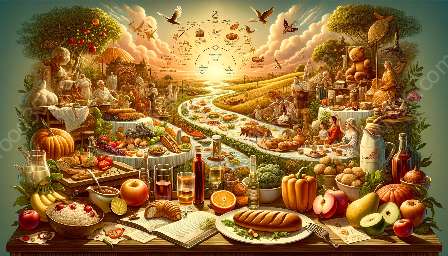Vegetarian cuisine has a long and complex history, with its development being influenced by a variety of factors, including religious beliefs and practices. The relationship between religion and vegetarianism has shaped the culinary traditions of communities around the world, leading to diverse and flavorful meat-free dishes that are enjoyed by people of various cultural and religious backgrounds.
The Evolution of Vegetarian Cuisine
Before delving deeper into the influence of religion on vegetarian cuisine, it is important to understand the historical context of vegetarianism as a culinary and dietary practice. Vegetarianism, defined as the practice of abstaining from the consumption of meat, has been a part of human culture for centuries, with evidence of early vegetarian diets dating back to ancient civilizations.
Ancient Greece and India are often cited as early adopters of vegetarianism, and their respective religious and philosophical traditions played a significant role in shaping dietary practices. Philosophers such as Pythagoras in Greece and religious texts in India promoted the idea of non-violence and compassion towards all living beings, leading to the development of vegetarian cuisine in these regions.
Over time, the concept of vegetarianism spread to other parts of the world, with various religious and cultural influences contributing to the diversity of vegetarian cuisines. From the Mediterranean region to East Asia, vegetarian dishes became an integral part of culinary traditions and continue to be celebrated for their unique flavors and nutritional benefits.
Religious Influence on Vegetarian Cuisine
Religion has played a significant role in shaping the dietary practices of communities around the world. Many religious traditions advocate for compassion, non-violence, and the sanctity of all life, leading followers to adopt meat-free diets as a way of expressing these values. As a result, the influence of religion on vegetarian cuisine is evident in the diverse array of meatless dishes that are enjoyed by people of different faiths.
Hinduism and Vegetarian Cuisine
Hinduism, one of the world's oldest religions, has a deep-rooted connection to vegetarianism. The concept of ahimsa, or non-violence, is central to Hindu beliefs, and this principle extends to dietary choices. Many Hindus choose to follow a vegetarian diet out of respect for all living creatures and as a means of living in harmony with nature. As a result, vegetarian cuisine in India has flourished, offering a wide range of delicious and nutritious plant-based dishes that are enjoyed by millions of people.
Buddhism and Vegetarian Cuisine
Buddhism, another major world religion, also promotes compassion and non-violence, which has led to the development of vegetarian cuisine in regions where Buddhism has a strong presence. Many Buddhists choose to adhere to a vegetarian diet as part of their spiritual practice, and this has influenced the culinary traditions of countries such as Thailand, Japan, and China. Buddhist monks, in particular, follow strict vegetarian guidelines as a way of upholding their principles of non-harm and simplicity.
Judaism and Vegetarian Cuisine
In the Jewish tradition, dietary laws outlined in the Torah have led to the development of kosher dietary practices, which include guidelines for the consumption of meat and dairy products. While the traditional Jewish diet includes various meat dishes, there is also a long-standing tradition of vegetarian cooking within Jewish communities. In fact, many traditional Jewish dishes are inherently vegetarian and showcase the rich heritage of plant-based cuisine within Jewish culture.
Christianity and Vegetarian Cuisine
Within Christianity, the practice of vegetarianism varies among different denominations and individual believers. While the overall emphasis is placed on moderation and self-discipline, some Christian communities and individuals adhere to vegetarian diets as a way of expressing compassion and stewardship for the environment. In recent years, there has been a growing interest in vegetarian cooking within Christian circles, leading to the adaptation of traditional recipes and the creation of new meatless dishes.
The Culinary Impact
The influence of religion on vegetarian cuisine has had a profound impact on the culinary world, contributing to the popularity and accessibility of meat-free dishes. Through the preservation and adaptation of traditional recipes, as well as the development of contemporary plant-based cooking techniques, religiously influenced vegetarian cuisine continues to inspire chefs, home cooks, and culinary enthusiasts worldwide.
Furthermore, the integration of vegetarian dishes into mainstream culinary landscapes has led to increased awareness of ethical and sustainable food choices. The rich history of vegetarian cuisine, shaped by religious influences, serves as a testament to the interconnectedness of culinary traditions and the human experience.

